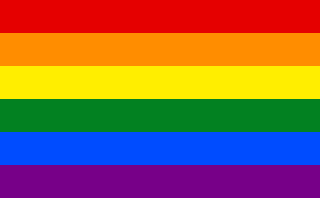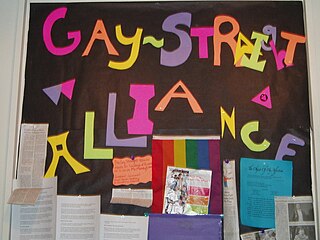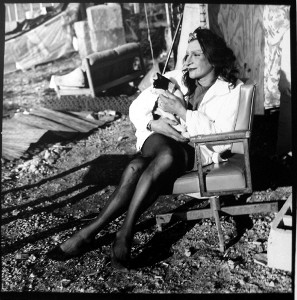
LGBT is an initialism that stands for "lesbian, gay, bisexual, and transgender". It may refer to anyone who is non-heterosexual, non-heteroromantic, or non-cisgender, instead of exclusively to people who are lesbian, gay, bisexual, or transgender. A variant, LGBTQ, adds the letter Q for those who identify as queer or are questioning their sexual or gender identity. Another variation, LGBTQ+, adds a plus sign "represents those who are part of the community, but for whom LGBTQ does not accurately capture or reflect their identity". Many further variations of the acronym exist, such as LGBT+, LGBTQIA+, and 2SLGBTQ+. The LGBT label is not universally agreed to by everyone that it is generally intended to include. The variations GLBT and GLBTQ rearrange the letters in the acronym. In use since the late 1980s, the initialism, as well as some of its common variants, functions as an umbrella term for marginalized sexualities and gender identities.

The LGBT community is a loosely defined grouping of lesbian, gay, bisexual, and transgender individuals united by a common culture and social movements. These communities generally celebrate pride, diversity, individuality, and sexuality. LGBT activists and sociologists see LGBT community-building as a counterweight to heterosexism, homophobia, biphobia, transphobia, sexualism, and conformist pressures that exist in the larger society. The term pride or sometimes gay pride expresses the LGBT community's identity and collective strength; pride parades provide both a prime example of the use and a demonstration of the general meaning of the term. The LGBT community is diverse in political affiliation. Not all people who are lesbian, gay, bisexual, or transgender consider themselves part of the LGBT community.

Stonewall Equality Limited, trading as Stonewall, is a lesbian, gay, bisexual and transgender (LGBT) rights charity in the United Kingdom. It is the largest LGBT rights organisation in Europe.

A gay–straight alliance, gender-sexuality alliance (GSA) or queer–straight alliance (QSA) is a student-led or community-based organization, found in middle schools, high schools, colleges, and universities. These are primarily in the United States and Canada. Gay–straight alliance is intended to provide a safe and supportive environment for lesbian, gay, bisexual, transgender, and all LGBTQ+ individuals, children, teenagers, and youth as well as their cisgender heterosexual allies. The first GSAs were established in the 1980s. Scientific studies show that GSAs have positive academic, health, and social impacts on schoolchildren of a minority sexual orientation and/or gender identity. Numerous judicial decisions in United States federal and state court jurisdictions have upheld the establishment of GSAs in schools, and the right to use that name for them.

A straight ally, heterosexual ally, or cis ally is a heterosexual and cisgender person who supports equal civil rights, gender equality, and LGBTQ+ social movements. Individuals may meet this designation through their actions without actively identifying as an ally.

LGBT culture is a culture shared by lesbian, gay, bisexual, transgender, and queer individuals. It is sometimes referred to as queer culture, while the term gay culture may be used to mean either "LGBT culture" or homosexual culture specifically.

Sylvia Rivera was an American gay liberation and transgender rights activist who was also a noted community worker in New York. Rivera, who identified as a drag queen for most of her life and later as a transgender person, participated in demonstrations with the Gay Liberation Front.
The Victorian Pride Lobby is a community-based advocacy group that works towards equality, social justice and advancing human rights for lesbian, gay, queer, bisexual and same-sex attracted people in Victoria.

New York City has been described as the gay capital of the world and the central node of the LGBTQ+ sociopolitical ecosystem, and is home to one of the world's largest and most prominent LGBTQ+ populations. Brian Silverman, the author of Frommer's New York City from $90 a Day, wrote the city has "one of the world's largest, loudest, and most powerful LGBT communities", and "Gay and lesbian culture is as much a part of New York's basic identity as yellow cabs, high-rise buildings, and Broadway theatre". LGBT travel guide Queer in the World states, "The fabulosity of Gay New York is unrivaled on Earth, and queer culture seeps into every corner of its five boroughs". LGBT advocate and entertainer Madonna stated metaphorically, "Anyways, not only is New York City the best place in the world because of the queer people here. Let me tell you something, if you can make it here, then you must be queer."

The following outline offers an overview and guide to LGBT topics.

LGBT Foundation is a national charity based in Manchester with a wide portfolio of services. With a history dating back to 1975, it campaigns for a fair and equal society where all lesbian, gay, bisexual and trans (LGBT) people are able to reach their full potential. They support over 40,000 people directly every year, and a further 600,000 online. They provide direct services and resources to more LGBT people than any other charity of its kind in the UK.
The National LGBTQ Wall of Honor is a memorial wall in the Greenwich Village neighborhood of Manhattan in New York City, dedicated to LGBTQ "pioneers, trailblazers, and heroes". Located inside the Stonewall Inn, the wall is part of the Stonewall National Monument, the first U.S. National Monument dedicated to the country's LGBTQ rights and history. The first fifty nominees were announced in June 2019, and the wall was unveiled on June 27, 2019, as a part of Stonewall 50 – WorldPride NYC 2019 events. Five honorees will be added annually.

The ongoing COVID-19 pandemic has highlighted inequities experienced by marginalized populations, and has had a significant impact on the LGBT community. Gay pride events were cancelled or postponed worldwide. More than 220 gay pride celebrations around the world were canceled or postponed in 2020, and in response a Global Pride event was hosted online. LGBTQ+ people also tend to be more likely to have pre-existing health conditions, such as asthma, HIV/AIDS, cancer, or obesity, that would worsen their chances of survival if they became infected with COVID-19. They are also more likely to smoke.
The LGB Alliance is a British nonprofit advocacy group founded in 2019, in opposition to the policies of LGBT rights charity Stonewall on transgender issues. Its founders are Bev Jackson, Kate Harris, Allison Bailey, Malcolm Clark and Ann Sinnott. The organisation has said that lesbians are facing "extinction" because of the "disproportionate" focus on transgender identities in schools.
Queer radicalism can be defined as actions taken by queer groups which contribute to a change in laws and/or social norms. The key difference between queer radicalism and queer activism is that radicalism is often disruptive, and commonly involves illegal action. Due to the nature of LGBTQ+ laws around the world, almost all queer activism that took place before the decriminalization of gay marriage can be considered radical action. The history of queer radicalism can be expressed through the many organizations and protests that contributed to a common cause of improving the rights and social acceptance of the LGBTQ+ community.










